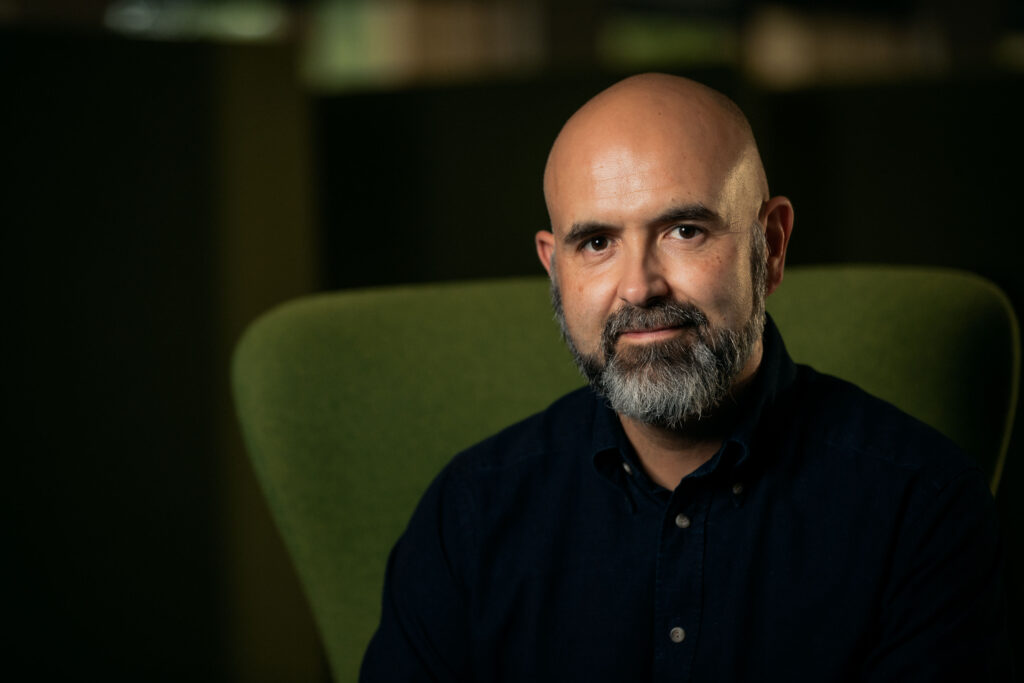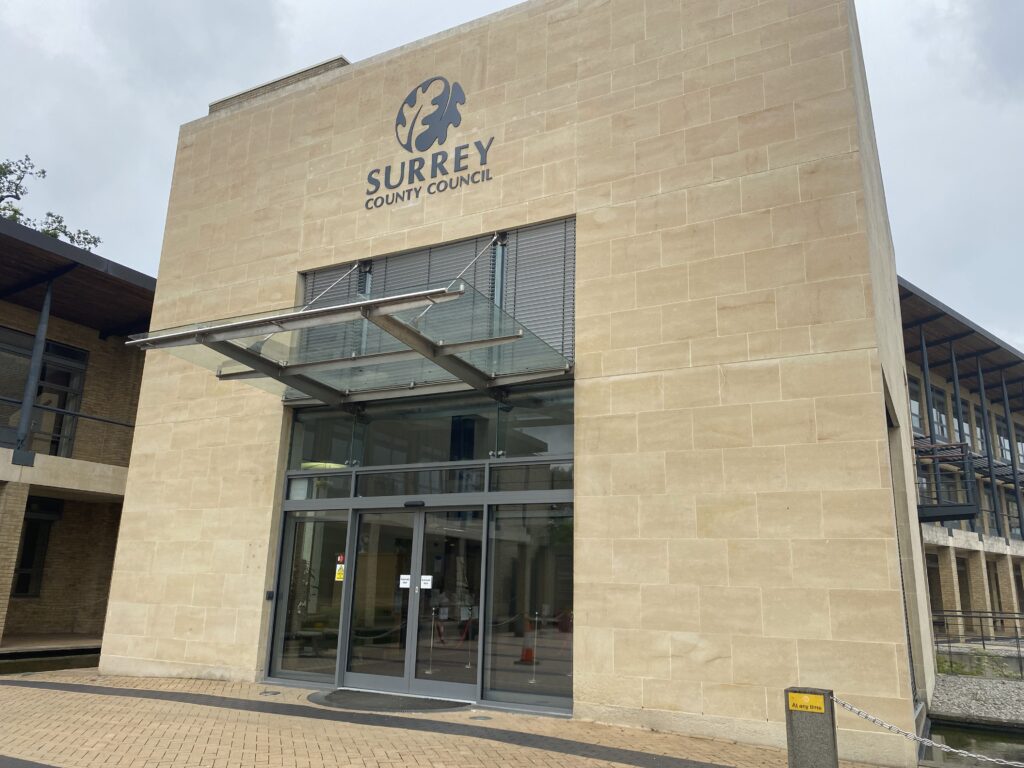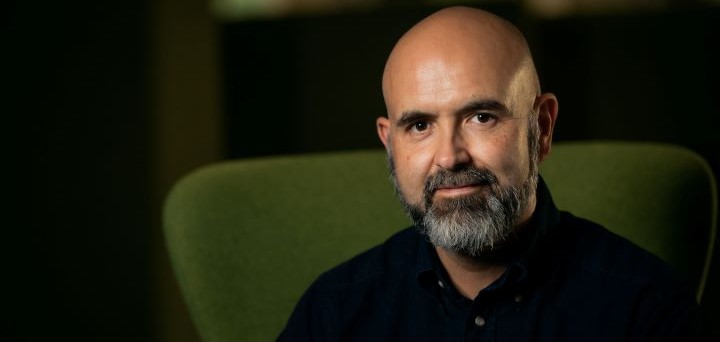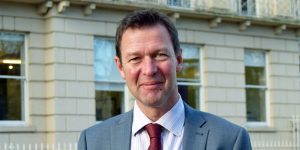Leigh Whitehouse has helped oversee a major turnaround in finances at Surrey County Council in his five years there. Lessons from that journey could be applied to the array of authorities currently struggling financially, the deputy chief executive, executive director of resources and section 151 officer thinks.
Room151’s interview series with s151 officers is sponsored by CCLA Investment Management, whose work with local authorities dates back to 1961.

While navigating the stormy waters of local government finance, it is vital for a council to maintain a sense of its own agency.
Do not give up, and do not think that problems can only be solved with more funding or with government help. Instead, aim to get everything running smoothly to the point that you can send the message to government that there is no mismanagement anywhere, and any inability to deliver on responsibilities is about resources being insufficient for the sector.
That’s the view of Leigh Whitehouse, deputy chief executive, executive director of resources and section 151 officer at Surrey County Council.
Whitehouse joined the local authority just over five years ago, when Surrey’s finances were under extreme stress. In the time since he has helped oversee a financial transformation built on getting back to basics and taking control.
“The organisation went through a very significant change earlier in 2018 when Joanna Killian joined as chief executive and inherited a really challenging set of circumstances. She initiated a whole organisation transformation programme,” he says.
“In terms of finances, when I came in we’d just had a report from CIPFA which essentially said our financial plans weren’t worth the paper they were written on; our financial management capability was insufficient; and we needed to revisit our plans and also revisit our capability both within the finance team and across the wider organisation if we were going to meet the financial challenges that we faced.”
It was this daunting landscape that Whitehouse was presented with. “Joanna had very quickly established a direction of travel and the level of seriousness with which this was going to be dealt with, which means that I had to come in and help execute that – but I didn’t really have to ever demonstrate the need for us to take action.
“There was a bit of cascading out to wider audiences but at the heart of the organisation it was absolutely understood that we were all pulling in the same direction on this and at the time, it was towards the end of the year, in which Northamptonshire had issued a s114 notice. Lots of people thought that we were a pretty good bet for who might go next.
“I think the only reason we avoided that was because Joanna and then Tim Oliver, who took over as council leader at the end of the year, initiated all the sort of actions we would have needed to take and the response that was required without needing any external intervention. We took control of that ourselves.”

The actions Whitehouse needed to take were different from those required in very different situations in previous jobs.
“I came straight from Bexley where I’d been for a year but I’d been in Kingston for seven years before that, and towards the end of that time, we were constantly thinking about how we could evolve and modernise our financial planning processes and thinking about new ways to keep the conversations fresh and innovative, whereas what was required at Surrey was a real back to basics approach,” he recalls.
Surrey County Council had been “quite vociferous” in its opposition to austerity and the “general fairness of that as an ask of authorities”, he says, and that spirit “imbued everything that we did as an organisation, it felt like”.
Because the council’s general belief was that what the government was asking it to do was “intolerable and impossible”, the organisation “had internalised that so it had almost given up that it was going to manage its budget because its leaders were saying it’s an impossible task and we need the government to save us”.
The authority’s budget management and accountability had essentially broken down at the point of Whitehouse joining. “People were just seeing themselves as powerless to do anything about what we were having to deal with,” he says.
Getting a grip
So how to respond to such a situation, and ultimately turn it around? “[It] was very much around building back those basics of budget management accountability and the responsibility for dealing with financial issues being one that was across the council, supported by an able finance function,” Whitehouse says. “We instigated a system of budget control so essentially, where the pressures were emerging in services, they needed to find the solutions themselves rather than expecting it to be dealt with corporately in some way.
“We emphasised each manager signing up to deliver their budget and their service priorities within that budget each year, which in some ways was merely symbolic, but it was very powerful in terms of the impact it had on people and making them realise it was their absolute responsibility to do that.
“All of that was absolutely backed by the corporate leadership team. There was a single mind and voice, which meant that we were quite quickly able to get a grip on that situation and turn what was a trajectory that was heading towards our reserves running out into one where we managed to stabilise the finances and build back some of those reserves that had been gradually eroded over the past few years.”

The pre-Covid timing was impeccable, Whitehouse feels, as having to do this 18 months later may have proved impossible. “We did it at a time when the finance settlements were relatively benign, just as the austerity piece started to soften, which meant we were able to go into Covid thinking, ‘what are we going to do in order to support our communities?’ rather than, ‘are we about to fall over?’.
“We looked at how we could sustain ourselves as an organisation so we were able to be very outward looking rather than inward, which is I think the key thing, with finance always being absolutely important.”
Getting through Covid meant that the authority was in a solid position to face the headwinds and challenges that have presented themselves over more recent times.
“Our reserves are at a reasonable level; we’re setting our budget each year without drawing down from reserves. We’ve got a level of contingency built into the budget each year that helps us guard against the sort of variances that emerge during the year. In each of the last five years, we’ve managed to end up with a small surplus on the revenue budget. That’s essentially from a lot of those disciplines that were instilled in the first year or so back in 2018/19. Despite the challenging external environment, our internal position is stabilised.”
In terms of treasury management, Surrey had been making a lot of decisions through a short-term lens, based on the impact on the current year. But 3-4 years ago the authority was able to switch this approach and start to take a more long-term view. “We very significantly increased our capital programme allowing us to invest in the sort of things that had been neglected for several years,” Whitehouse reports.
Rising interest rates and a slowing capital budget present a new challenge, and short-term exposure must be well managed. “I think the challenge for us is just having to keep reframing the programme to make sure it’s affordable,” says Whitehouse. “We’re still delivering the things that we need to.”
A rapidly changing picture
Moving to service provision, different pressures have emerged in different areas in each year over the course of Whitehouse’s tenure so far. “There’s a limited number of things it will ever be, but it’s usually a different thing at one time,” he notes. But the last two years have felt different, he says.
“We would normally have been able to get on top of the main pressures and address them by the end of year, whereas last year and this, it feels like there are things bubbling up that just have too big an impact to do that. There’s a stickiness to some of those pressures and a magnitude that wasn’t there before.”

Last year, the main pressure was home to school transport, and this year it’s children’s social care placements, in common with a lot of authorities. “It’s not that there are necessarily more children going into placements – it’s the fact there’s a shortage of appropriate ones and the cost of those that are available being astronomical at the moment,” he explains. “That’s really hitting us.”
In addition to these pressures, councils such as Surrey have found themselves in the unusual position of having to operate in a high inflation environment. “It’s the first time inflation has been anything like that in in my career, and most people in the team won’t have worked in that sort of environment,” he comments. “Dealing with a rapidly changing picture is really tricky – and then it feels like we’re in a time of heightened political sensitivity as well.”
Whitehouse warns of an “organisational fatigue” that is the inevitable result of the financial conditions coupled with the experience of Covid, and in Surrey’s case, the hard work needed to turn the organisation around.
“I think that can be really wearing particularly when you overlay the sort of recruitment market conditions that we’ve had over the past year and a bit, which mean that it’s difficult to get in staff to fill particular roles. If we can’t fill those vacancies, the impact falls back on the staff who are already here,” he says. “There’s a bit of feeling like we’re inching up the mounting and finding out the peak is a bit higher than we thought each time we reach what we thought the peak might have been.”
The key is to stay the course and stick to the financial discipline that has been instilled into the council, that now underpins everything Surrey does. “That’s the reason we’re in a position to think about where we might invest in new opportunities or expand that capital programme, for example,” he notes. “We need to cling on to those behaviours, if we’re going to keep ourselves in a decent position.”
Section 114 warnings
Surrey might have moved away from s114 territory, but it seems many other councils are in or nearing it. Can Whitehouse offer any advice to these councils? He notes that in a recent conversation with a chief executive from another county council which is struggling financially, he had been questioned on why he had not been shouting about the problems of funding.
His answer is revealing. “Partly it’s because of that journey that we’ve been on: we recognise some of the dangers of projecting outwards the causes and the solutions to this. One of the key things the organisation did was regain a sense of its own agency. So being able to convey the very real message to government that this isn’t about mismanagement anywhere, this is about resources being insufficient for the sector to deliver the responsibilities it has. It’s about being able to do that while still internally recognising that you’ve got the power to get through this.”
There are a couple of exceptions to this sentiment, though, with Woking being one. As a district within the same borough, Surrey is “trying to lean in and support them wherever we can” as part of the Surrey local government system, Whitehouse says.

Whitehouse himself is a member of Woking’s improvement panel. “As an external voice, I’m trying to apply some of the lessons that we learned five years ago,” he adds. “But there’s a really significant challenge and this is one of the cases where there needs to be some sort of intervention by the government to do something that they’ve not done before in tackling some of the problems that Woking have got.”
On the whole, though, while it is true a council issuing a section 114 notice “will then have the power to get out of their situation”, they’ve “got that same power beforehand if people can be galvanised in the right way”, Whitehouse thinks. He adds: “It’s important for senior leaders beyond the s151 officer to be absolutely clear and unequivocal in the messaging about what needs to be done.
“It’s also about those bedrocks of good financial management, accountability and facing up to the problems that you’re presented with rather than trying to run away from them.”
Whitehouse thinks the root cause behind many s114 notices is often that councils have sought to avoid reality in some way. “Northamptonshire did this in their situation, by having an expectation that government would bail them out at some point, which is where we got to as a council too,” he says. “But you can do that yourselves with or without a s114 if everyone is pulling in the same direction and on the same page.”
Another cause of s114s is an inability to make decisions. “If you’re unable to take tough decisions, ultimately you’ll run out of money,” Whitehouse says. “But actually, the money might not be the core problem. It might be your ability take the right and the tough decisions.”
Ultimately, councils are finding themselves in s114 territory because “the tide has gone out in terms of the level of resources available and therefore these issues are being exposed”, Whitehouse says. Being a section 151 officer at the moment means operating in an environment of heightened expectation and pressure as a result of all those challenges. “The importance of getting things right is probably increased because there are fewer places to hide,” Whitehouse adds.
Although his remit at Surrey is broad and therefore internal communication is a matter of course, he thinks every s151 officer should also make it a priority to connect into all corporate services. “Usually they are the levers and the mechanisms through which some of our financial objectives need to be delivered – so I need to make sure that they are in alignment with what we are doing from a finance perspective,” he says.
External communication is equally vital. Whitehouse sees “huge value” in working collaboratively with peers – even if it is more difficult to do so the more distanced geographically you are.
“When I was at Kingston, for example, I used to work closely with my counterparts in neighbouring boroughs and see them on at least a weekly basis. I think in a county role because you just haven’t got that geographical connection to your peers so much you meet me face to face much less often – but I have a good set of contacts and many respected colleagues. That can be hugely helpful for understanding some of the challenges you’re facing – is it a local thing, or is it is it a wider thing? But also sharing some of the solutions that are being implemented.”
As the intensity of the role of the section 151 officer increases, that peer network becomes ever more important. “It is a difficult role and being able to talk through things with experienced colleagues was hugely valuable when I started over 13 years ago, and it remains so now.”
Room151’s interview series with s151 officers is sponsored by CCLA whose work with local authorities dates back to 1961.
Our most recent interviews in the series have featured Cambridgeshire County Council’s Michael Hudson on the positive difference he has made in his career so far, Peterborough City Council’s Cecilie Booth on navigating a path to financial stability and Slough Borough Council’s Adele Taylor on what it means to take on a role as a section 151 officer in an authority under government intervention.
—————
FREE weekly newsletters
Subscribe to Room151 Newsletters
Follow us on LinkedIn
Follow us here
Monthly Online Treasury Briefing
Sign up here with a .gov.uk email address
Room151 Webinars
Visit the Room151 channel












